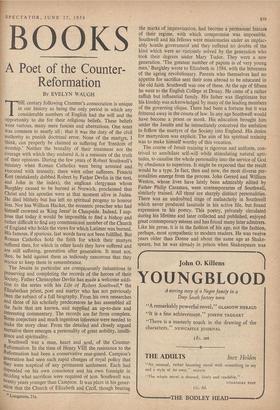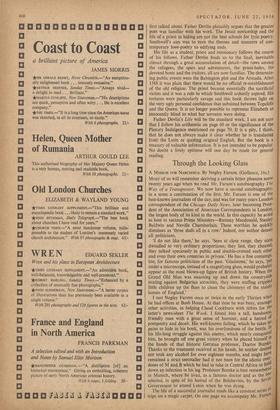BOOKS
A Poet of the Counter-
BY EVELYN WAUGH THE century following Cranmer's consecration is unique in our history as being the only period in which any considerable numbers of English had the will and the opportunity to die for their religious beliefs. These beliefs were various, many mere fancies and aberrations. One tenet was common to nearly all : that it was the duty of the civil authority to punish doctrinal error. None of the martyrs, I think, can properly be claimed as suffering for 'freedom of worship.' Neither the brutality of their treatment nor the courage with which they endured it, is a measure of the truth of their opinions. During the few years of Robert Southwell's ministry when Roman Catholics were . being arrested and executed with intensity, there were other sufferers. Francis Kett (mistakenly dubbed Robert by Father Devlin in the text, and John in the index), the anglican clergyman whom Burghley caused to be burned at Norwich, proclaimed that Christ and his apostles were at that moment alive in Judea. He died blithely but has left no spiritual progeny to honour him. Nor has William Hacket, the eccentric preacher who had himself crowned as 'King Jesus' in Cheapside. Indeed, I sup- pose that today it would be impossible to find a bishop and rather difficult to find any communicant member of the Church of England who holds the views for which Latimer was burned. His famous, if spurious, last words have not been fulfilled. But Roman Catholics hold the faith for which their martyrs suffered then, for which in other lands they have suffered and are still suffering, generation after generation. It must not, then, be held against them as tediously rancorous that they rejoice to keep them in remembrance.
The Jesuits in particular are conspicuously industrious in preserving and completing the records of the heroes of their Society. Father Christopher Devlin has made a welcome addi- tion to the series with his Life of Robert Southwell,* the Elizabethan priest, poet and martyr who has not previously been the subject of a full biography. From his own researches and those of his scholarly predecessors he has assembled all the facts that are known, and supplied an up-to-date and interesting commentary. The records are far from complete. Some conjecture and much ingenious inference were needed to make the story clear. From the detailed and closely argued narrative there emerges a personality of great nobility, intelli- gence and spirituality.
Southwell was a man, heart and soul, of the Counter- keformation. In the time of Henry VIII the resistance to the Reformation had been a conservative rear-guard. Campion's generation had seen such, rapid changes of royal policy that they were sceptical of any permanent settlement. Each had depended on his own conscience and his own foresight in deciding what sacrifices were required of him. Southwell was twenty years younger than Campion. It was plain in his gener- ation that the Church of Elizabeth and Cecil, though bearing Longmans, 21s. the marks of improvisation, had become a perthanent featuie of their regime, with which compromise was impossible. Southwell and his fellows were missionaries under an implac- ably hostile government and they suffered no doubts of the kind which were so variously solved by the generation who took their degrees under Mary Tudor. They were a new generation. 'The greatest number of papists is of very young men,' Burghley wrote to Elizabeth in 1584, with the bitterness of the ageing revolutionary. Parents who themselves had no appetite for sacrifice sent their sons abroad to be educated in the old faith. Southwell was one of these. At the age of fifteen he went to the English College at Douay. He came of a rather raffish but influential family. His father was illegitimate but his kinship was acknowledged by many of the leading members of the governing clique. There had been a fortune but it was frittered away in the courts of law. In any age Southwell would have become a priest or monk. His education brought him under the Jesuits and he immediately conceived the ambition to follow the martyrs of the Society into England. His desire for martyrdom was explicit. The aim of his spiritual training was to make himself worthy of this vocation.
The course of Jesuit training is rigorous and uniform, con- trived to annihilate self-will while stimulating natural apti- tudes, to canalise the whole personality into the service of God by obedience to superiors. It might be expected that the result would be a type. In fact, then and now, the most diverse per- sonalities emerge from the process. John Gerard and William Weston, whose lives have lately been admirably edited by Father Philip Caraman, were contemporaries of Southwell, similarly trained. All three are sharply distinct personalities. There was an undoubted tinge of melancholy in Southwell which never produced lassitude in his active life, but found expression in his poetry. This poetry, privately circulated during his lifetime and later collected and published, enjoyed great contemporary esteem and has found many later admirers. Like his prose, it is in the fashion of his age, not the fashion, perhaps, most sympathetic to modern readers. He was twelve years older than Donne and about the same age as Shake- spearp, but he was already in prison when Shakespeare was first talked about. Father Devlin plausibly argues that the greater poet was familiar with his work. The Jesuit noviceship and the life of a priest in hiding are not the best schools for lyric poetry. Southwell's aim was to turn the themes and manners of con. temporary love-poetry to edifying ends.
His life as a student, priest and missionary follows the course of his fellows. Father Devlin leads us to the final, inevitable climax through a great accumulation of detail—the rows among the refugees, the spies and adventurers, the priest-holes, the devoted hosts and the traitors, all are now familiar. The determin- ing public events were the Babington plot and the Armada. After 1588 it was plain that there would be no official re-establishment of the old religion. The priest became essentially the sacrificial victim and it was mole to which Southwell ardently aspired. His tortures were particularly savage and this boOk throws light on the very ugly personal confidence that subsisted between Topclitfe and the Queen. It is no longer possible to represent Elizabeth as innocently blind to what her servants were doing.
Father Devlin's Life will be the standard work. I am not sure that I follow his arithmetic on page 60 or the significance of the Plenary Indulgence mentioned on page 70. It is a pity, I think, that he does not always make it clear whether he is translating front. the Latin or quoting original English. But the book is a treasury of valuable information. It is not intended to be popular. No doubt a lively epitome will one day be made for general reading.



































 Previous page
Previous page